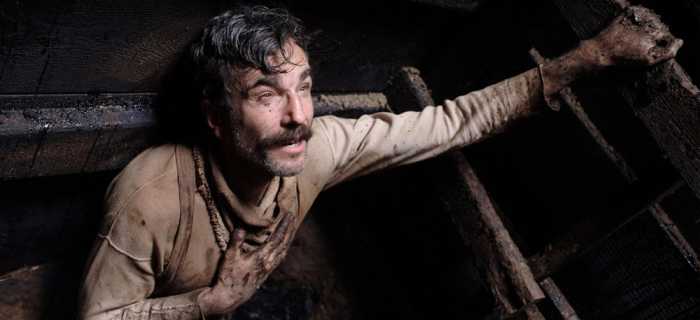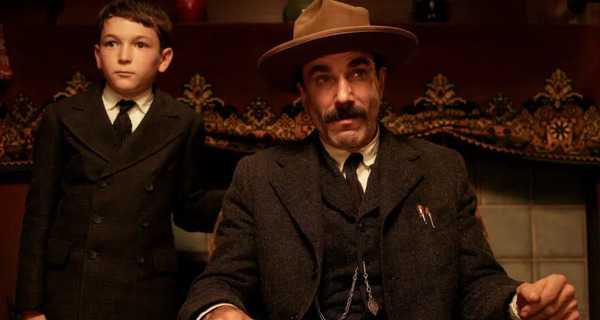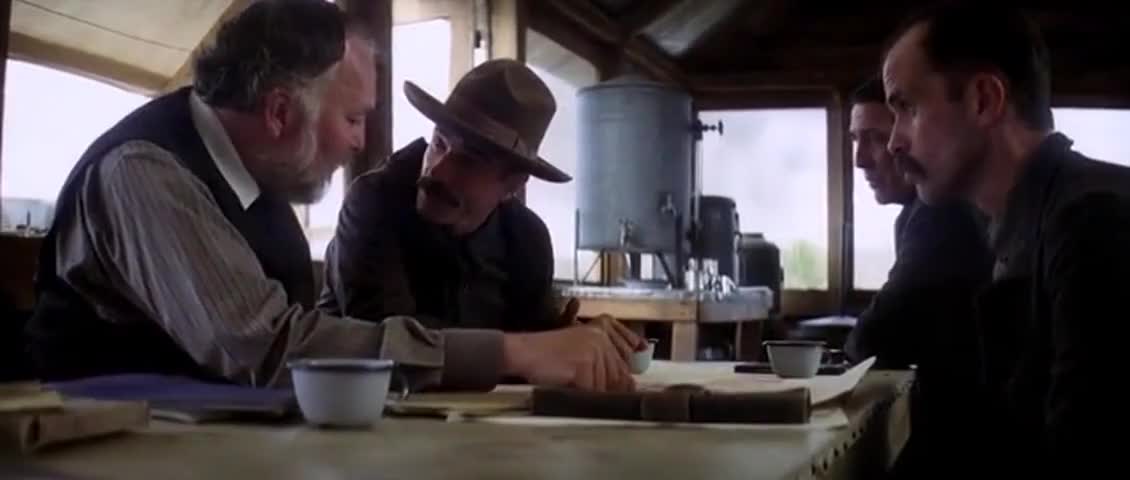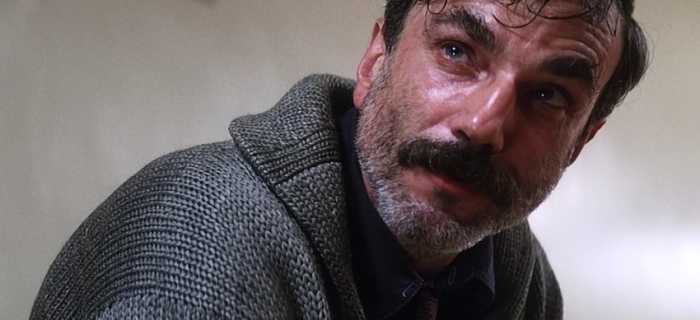Alienation in “There will be Blood”
“The alienation of man thus appeared as the fundamental evil of capitalist society.”
Karl Marx
Capitalism is an ever growing maw, that takes from nature and hordes for itself. Mark Fisher, author of Capitalist Realism once wrote, “It is easier to imagine the end of the world than the end of capitalism”, but under that lense one must turn an eye to how it became so dominant. In the seminal work of Paul Anderson, “There Will Be Blood”, we see exactly how capital accrues, destroys the family, perverts human sentimentality, and destroys any all competition.
Primitive Accumulation

Daniel Plainview was a capitalist in the most primal sense. That is not to say he was without emotion, only that success is what drove him. Adam Smith, The Father of Capitalism, posited primitive accumulation as basically the merit of a worker being rewarded. The tenacity to succeed, the drive to push through obstacles. The audience can see this in Daniel at the onset of the film. He’s a prospector for silver in New Mexico and risks life and limb for his early earnings, he then leverages them into the starting capital for his oil drilling company. This is, however, only one interpretation of the idea.
Another could easily see this primitive accumulation for what it was at the time. Daniel wasn’t any more scrappy than the people who lived on that land before him, his claims to the land were backed by the fact the natives had been run off the land and allowed him to destroy nature itself to reap profits. His “ingenuity” came from stumbling upon oil before others in the area could and then rapidly expanding to seize up as much of the land as possible by any means possible.
Over the course of the film, the audience sees just how the mode of production incentivizes anti-social behaviors, the desecration of the sacred, the dissolution of the family, and the ways that it destroys an individual.
Destruction of family
“I’ve Abandoned My Boy!”

One of the more important relationships in the movie is shared between H.W. and Daniel. Some have interpreted their relationship as purely a facade crafted by Daniel to play the role of a family man, but that can’t be completely true because after H.W. loses his hearing Daniel does his best to try to get him healed up.
It’s when H.W. has a possible replacement, namely Henry, Daniel’s supposed brother, that Daniel gives up on healing H.W. and sends him away but even then. He takes care of his son, as opposed to cruelly abandoning him to the wilds. He does in part take care that his son is educated, and able to lead a successful life despite his impairment. That said he’s not an overly affectionate father and he doesn’t do nearly enough to repair their frayed relationship.
In their final interaction, Daniel disowns H.W. screaming he’s nothing but a bastard in a basket. But, how is that even remotely true? How could the only father the boy knew to discard him so easily?
If one looks at the logic of Daniel, the logic of Capital it becomes clear. Daniel views him as explicit competition to his enterprise and as such views him no longer as the boy he raised but as an enemy to be subsumed and destroyed. The “family” is gone, destroyed, and in its place, the zombie of capital. A machine of perpetual growth that seeks more and more to fill its cavernous maw.
Exploitation

Here, if you have a milkshake, and I have a milkshake, and I have a straw. There it is, that’s a straw, you see? Watch it. Now, my straw reaches acroooooooss the room and starts to drink your milkshake.
Daniel Plainview speaking to Eli
Eli Sunday, played by Paul Dano, is the antagonist to Daniel representing the religious caste but also the nascent petit bourgeoisie. He aspires to Daniel’s level and is destroyed by his failure
The setting of “There Will Be Blood” is at the turn of the century in California. Daniel is positioned as the enterprising oil man with a coy facade of a family man. He uses the facade to try to buy land cheaply.
This is the rub, he doesn’t need to do this. He can more than afford to pay a fair rate. But this is where the exploitation becomes clear.
One can argue that exploiting the resources of an arguably empty area is fair game. It’s another entirely to come to a land with the intent of undercutting the people who live there. Granted said people were only there because of the American state cleansing the land of the indigenous people in the area but that doesn’t mute the point that Daniel is explicitly conniving. He uses every trick in the book to get all that he can for the lowest price possible even though he could more than afford to deal fairly with the people of Little Boston, so why doesn’t he?
Greed is one element of it but also, the nature of business is to mitigate costs and maximize profits. The name of the game is to get as much as you can however you can and as such the “suckers” are left holding the bag.
When Eli comes to see Daniel on bended knee and is subsequently killed by him, he is already defeated. Daniel’s cruelty could be read simply as a means of disregarding a useless tool. Eli had caused Daniel a grievous insult, but the violence brought to bear was disproportionate.
Except for the fact that at this point he could do it. Through all his dealings, Daniel had become mad with power and at the pinnacle of his power, his enemy, his competition comes to him begging for aid. He is crushed as competition is crushed under capital.
Alienation as a plot point
I have a competition in me. I want no one else to succeed. I hate most people.
Daniel to his “brother” Henry
Daniel throughout the film is shown at his economic lowest and highest alone.
When he’s just a scrappy silver prospector, struggling to survive, he’s alone. It is through community however he grows his business, but after decades of growth, he’s alone, aside from his butler.
What does it say that all meaningful connections for Daniel were destroyed, what does it say that his core driving principle was wanting to be away from people, to be isolated, and when he gets that it’s still not enough for him?
A popular idiom is that it’s lonely at the top. But, the way that one makes it to that proverbial top can show why said person is lonely. In the case of Daniel, he lashed out at any betrayal, any slight, any act made against him with indignation. Reading him as an avatar for capital, Daniel exists to consolidate power. He is not happy with some of the money, he needs all of it. He’s not happy with some of the land, he wants all of it. Although, even when he’s offered the missing land, it doesn’t matter to him. He doesn’t need it more than he needs a greater sense of satisfaction that comes from humiliating Eli.
“I’m Finished.”

At the end of the film, after murdering Eli, and driving away H.W., getting all the money he could’ve ever wanted meant nothing to Daniel Plainview. As a person, he found himself addicted to the greed allowed to him through Capitalism.
But could he have made another decision? Was a better world possible for him? Surrounded by the friends and family he had driven away? It’s easy to think that individuals are shaped by their greed and that if that impulse was tempered, they’d be better people but also fundamentally different people.
Daniel was always a greedy, self-serving individual, Capitalism just allowed him to fully indulge his worst tendencies. But, that doesn’t absolve him or the system. His greed came as a direct result of how he was incentivized, to discard useless things, and to stay driven solely toward the accumulation of endless resources.
His ending was the only ending possible from the moment he found the piece of silver at the beginning of the movie.
An empty solitude stained with the blood of his enemy and false kin but also the scorn of all who knew him.
What do you think? Leave a comment.











Great work! Thought provoking piece! I was happy to be a part of the editorial process! Thank you for a wonderful piece!
So glad that There Will Be Blood’s reputation is growing with each passing year. Anderson is an astonishing talent, and his humility is incredibly refreshing in this age of the narcissistic despot.
He has made many great films, but one i’ve enjoyed over again and again over the years is Punch Drunk Love. Wonderful film and a career best for Adam Sandler.
It should be considered an unfair advantage if your film has Daniel Day Lewis in it.
I like the film a lot, those first 20 minutes put the hook in me, Greenwood’s astounding score, and once Plainview opens his mouth, I had no choice to watch in awe. “I’m finished!” Might be the best ending line in decades.
My mate went to drama school with Daniel Day Lewis, where he was known as Daniel Day Job. It was thought he would only get by flipping burgers or despatch riding. How wrong they were ! At the time few people saw the market for an odd looking gent who could provide borderline offensive impersonations of alienated individuals with dreadful mental health issues.
Just noticed he never bothered to learn sign language to communicate with his own son.
Wasn’t it revealed near the end that the only reason he adopted his son is so it would be easier to buy land with a child mascot?
The movie was brilliant. It was a battle between a ruthless capitalist and an equally ruthless, grifting evangelist for who could be more despicable.
Im currently having dillemma about the true meaning behind this film because of my lecturer at the university. From his point of view Daniel is an honest man because he stays true to his beliefs and goals. that he loves his son because he sent him away. I just dont get the point because it is very clear in the movie that the character is very vile and evil but still my lecturers opinion should be considered because he is one of the best educated and literate people I know.
Love the film, but I really really struggle with Dano in it.
I just watched it… no idea what it was about. Seemed disjointed, the dialogue cartoonish and something like Children of the Corn mixed with Tarantino machismo. The characters seemed cliched. Was it supposed to be some confrontation between atheism, betray of belief? The madness of power? Confusing.
At first, I didn’t like “There Will Be Blood” at the time. But after a couple rewatches, I find myself to be drawn into Daniel Day Lewis’ performance because it’s really more of an inside look into a man who is so deep in his obsession with business that he doesn’t know how to communicate normally with other people, including his adopted son. Even after he’s earned everything (including a mansion), he’s now officially a lonesome shrieking madman in a lavish prison with no connection at all. It’s really a tragic film to watch.
I’m still trying to figure out how he knew he wasn’t his brother.
Daniel Plainsview reminds me of Warren Buffet.
To me the 2 most interesting character archetypes are good people with a bit of evil inside them and bad people with a bit of good inside. Daniel is the most extreme case of the ladder. He did do some good in the movie but its overshadowed by his acts of evil.
A performance so outrageously good nothing will be replicated decades from now.
This movie really shows that the so called “American Dream” can easily become a nightmare.
I drink your milkshake!
Daniel Plainview is actually tortured by the fact he DIDN’T die when he fell into the silver shaft.
Trust me. I wish I would have died young, and now I suffer from life itself.
I fell asleep iwhile watching TWBB, probably because it was over 2 hours of a one man show and he didn’t tell one joke! Come to think of it I fell asleep in Magnolia too, that was a long one too, highly emotional, intense, beautifully surreal and, oh yes, crap. Such a let down after Boogie Nights.
Truly one of my favorite character in all of films.
Dracula of 1920s.
What!?
I’ve often heard interpretations of this film, focused on the symbolism or presence of oil specifically, that propose Daniel to be a victim. In these interpretations, the oil itself is the antagonist of the film — similar to its role in “Oil!”, the Upton Sinclair novel that the film is based off of. When I considered these interpretations alongside your points about isolation, I got to thinking about how Daniel is never really alone in the film’s onset as you suggest. The opening score paired with the mountain landscape shots convey the evil presence of oil under the ground, waiting to be dug up.
Ooh I like that. Oil as the antagonist is something I haven’t seen before.
Daniel Plainview is the encompassment of pure Evil.
Whence cometh evil?
It’s a very good movie, however about 3/4 through when it jumps forward a generation that seems really disjointed, doesn’t serve much purpose and was, I think, a bit gimmicky, like “well we need to shoehorn him as an old guy all bitter and lonely so let’s just skip forward til the kid’s all grown up. When I saw it in the cinema it really took me out of the flow of the story and annoyed me… the film was great enough without it, put it that way.
I’d agree. The final scene in fact I suddenly giggled and became convinced the entire film had been, if only to end on that note, some kind of elaborate wind up or practical joke!
I laughed a lot when I watched it.
Phenomenal film, and an incredible performance by Daniel Day Lewis. One of the all time greats.😊
Daniel Day-Lewis looks exactly like my father in this film and creeps me out to no end 😆
I can do a great Daniel impression so I always say “I DRINK YOUR MILKSHAKE!!!” to my kids… Cracks them up…
A lot of people don’t know what it’s like to be at the top. And what it takes. That’s why they’re not at the top. But you can’t hate a character in fiction, and then vote for a real life one to be your president.
one thing i noticed is that whenever he does something morally ambiguous or wrong, the shots always place him on the left. when he does somthing good hes on the right of every shot.
Daniel was a misinhthrope.
Yes, and?
He was probably the most sane, non backstabbing person in the movie… He even told Eli he respected Paul and that he runs his own oil drill… He just had a hatred of frauds, and it, as it would anybody, made him an asshole.
I see a guy that will stop at nothing get what he desires. He even wouldn’t let his own son’s injury stop him. But I see the whole world just trying to beat him down and it truly breaks him in many ways. But Eli, I can’t stand him. A small man that likes to rub any little success he gets in life in people’s faces. If Eli hadn’t come to talk to Daniel, even gloats a bit, he would have lived. I believe this story is about the sin of pride and how it can be used to destroy you in many ways.
I love this goddamn movie. I grew up among narcissists and the dynamic between the vulnerable narcissist antagonist and the grandiose narc brings up so many, recent and distant, memories.
My dad almost become a Daniel Plainview when he lost his business, going through a drinking binge that lasted years. Instead of lashing out emotionally, to the point of murder like in the film, my dad’s body gave up first and now he lives with feet that are withering away due to gangrene. We did have to call the cops due to him throwing tantrums, but i dont think he has the energy to really do that now.
I never got this film at all. Wouldn’t recommend it to anybody.
Boo
One of my all time favorite movies.
Daniel Day Lewis = Dutch Van Der Linde (RDR2)
A good essay on a movie I thought was not particularly good. I guess Capitalism addressed in the movie is there, I thought it was about the character of a man. Capitalism, or a version of it, was the setting to portray a character.
I suppose but I see the critique of Capital as more fundamental.
It’s disappointing that the good points made in this article are wasted on the wrong word. The issue worth critiquing is called “greed”, not “capitalism”. Greed is putting self before the good of others like we see illustrated so poignantly in There Will Be Blood. Capitalism, on the other hand, is merely a socially funded means to accomplish good that one cannot afford on his/her own. Capitalism is the original “crowdfunding.” By involving others in this process, the borrower who succeeds in the endeavor benefits, as do those who lend (bank depositors). More good has been accomplished through capitalism than through any other funding method humankind has ever come up with. Better to call a spade a spade and expose the true villain… the selfishness that exists, in varying degrees, in every human heart. It will hijack any system you give it for its own ends. Although capitalism is subject to a person’s greed, it is less-so than other economic structures due to the fact that participation is optional. Where I have a choice, under capitalism, as to what I want to invest in, under other structures like socialism or communism, I do not. It is that lack of accountability that makes those models even more susceptible to human greed.
Lol, no.
You really thought that through, didn’t you!
Nope.
Well observed